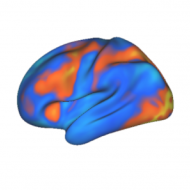Time magazine has just published an intriguing article on the neural basis of consciousness. The article was written by Steven Pinker, a cognitive scientist known for his controversial views on language and cognition. Here are several excerpts from the article… On the brain being the basis for consciousness: Scientists have exorcised the ghost from the …
Monthly Archives: January 2007
Wandering Minds and the Default Brain Network
Several news articles have come out today which seem to imply that a recent Science report's main finding is that the mind wanders for a purpose (see this Forbes article), and that "daydreaming improves thinking" (see this Cosmos article). These are typical of fabrications used by popular science journalists to pique the public's interest. Mason, …
Continue reading “Wandering Minds and the Default Brain Network”
Brainprints
Normally, neuroscientists try to discover things about the brain, as if it were one monolithic thing. Might the differences between individual brains be important, or useful? A recent article in New Scientist describes recent efforts to use each person's unique brain activity patterns as a kind of fingerprint (or 'brainprint') for security purposes. The system …
Can a Neural Network be Free…
…from a knee-jerk reaction to its immediate input? Although one of the first things that a Neuroscience student learns about is "reflex reactions" such as the patellar reflex (also known as the knee-jerk reflex), the cognitive neuroscientist is interested in the kind of processing that might occur between inputs and outputs in mappings that are …
The Will to be Free, Part I
Freedom to choose is the first axiom of our being. We assume freedom with each action that we take, and we are annoyed when we are forced to act "against our will". A recent article on free will at the New York Times explains that determinism is a direct implication of the brain being the …
Neuroscience Blogs of Note, Part 2
I will follow up MC's recent post with a brief review of three other neuroscience-related blogs that are worth mentioning as we begin Neurevolution. Brain Waves (http://brainwaves.corante.com/) is a self-labeled "neurotechnology" blog. Written by Zack Lynch, it is a real-world look at the effects and benefits derived from neuroscience research with regards to society, culture …
Neuroscience Blogs of Note
As the first post on Neurevolution, I would like to review several other neuroscience blogs that have been around for a while. First is Mind Hacks, a blog by the two authors of the book by the same name. According to the authors, the blog and book include "neuroscience and psychology tricks to find out …
